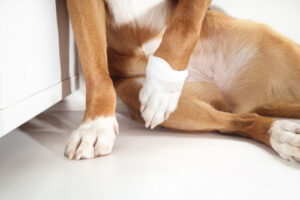Update on Canine Respiratory Virus in Colorado
We are writing to inform you about the elevated number of canine respiratory disease cases that have been seen, throughout Colorado, and in several other states. Veterinarians in Colorado are currently reporting double the number of cases from what is typically seen during a canine infectious respiratory disease outbreak.
The cases are presenting with prolonged coughing, which can last weeks to months, with minimal response to treatment. In September, October, and November of this year, Colorado State University Veterinary Teaching Hospital has seen more than double the cases of canine pneumonia compared with the same period in 2022. Some cases have been fatal.
The mode of transmission remains unclear, but early observations indicate it appears to be contagious and most likely from direct contact with other dogs.
Current recommendations for pet owners include:
- Keep vaccines updated: Ensuring dogs are up to date with vaccinations is critical. While the existing vaccines may not specifically target this unknown infection, maintaining overall health through routine vaccinations can help support a dog’s immune system in combating various infections. Optimal protection against common respiratory infections includes the annual intranasal vaccine for Bordetella, Adenovirus 2, and parainfluenza vaccine, combined with the injectable canine influenza vaccine. Avoid bringing a dog into the community until two weeks after the last dose of a vaccine and immunity has developed.
- Watch them closely: Veterinarians advise pet owners to monitor their dogs closely for progressive coughing that may be accompanied by signs of ocular or nasal discharges and sneezing.
- Consult your Boulder Veterinary Hospital DVM: If these clinical signs develop, consult your veterinarian immediately, particularly if your dog concurrently loses its appetite, has trouble breathing, is coughing continuously, or is extremely lethargic.
- Avoid voluntary gatherings of dogs / minimize exposure to unknown dogs: For the time being, it would be prudent to avoid dog parks and other social events where your dog could have contact with dogs of unknown vaccination or health status. If boarding, daycare or grooming are required, complete the vaccinations described above before attending. Avoid allowing your dog to eat/drink from a communal water/food bowl.
Boulder Veterinary Hospital is keeping a close eye on the development of this outbreak. We have treated several patients who appear to have contracted this novel virus. We have increased sanitization protocols and are keeping patients who come in with these symptoms separate.
If you notice your dog is coughing, sneezing excessively, having mucoid discharge from the nose or eyes, has reduced appetite, has trouble breathing, or is extremely lethargic, please call us to schedule an appointment. In order to minimize contagion, please remain outside and call us upon arrival at the hospital so that we may properly escort you and your dog into the hospital while avoiding the busy lobby area.
We are taking this novel virus extremely seriously as it has been known to affect dogs of all ages and health statuses. If you have concerns about the health of your pet for any reason, please call to schedule an appointment.
The DVM will examine your dog, listen to their heart and lungs, and prepare a treatment plan best suited for your pet based on the results of an exam.
***If your pet is experiencing difficulty breathing, this is considered an emergency and should be addressed immediately by a veterinarian either here at Boulder Veterinary Hospital or at an emergency clinic in the area.
For up-to-date information, please check: ag.colorado.gov/canine-respiratory-disease
Wishing you a happy and healthy holiday season,
Melissa Jordan, DVM, Cassie Vespa, DVM, and Amanda Burdette, DVM and the Boulder Vet Staff
Information gathered from: Colorado Department of Agriculture, Colorado State University Veterinary Diagnostic Laboratory, Kansas State University Veterinary Diagnostic Laboratory, University of New Hampshire Veterinary Diagnostic Laboratory





